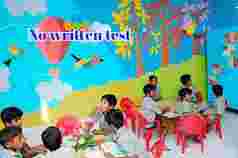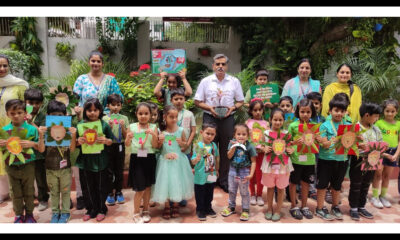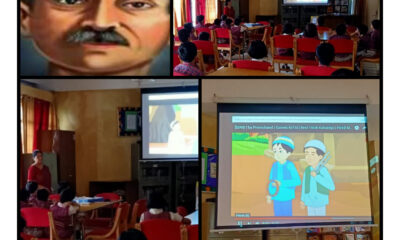Education
No written test until second grade: The draught National Curriculum Framework (NCF) A new education draught explains the evaluation process
Published
1 year agoon

The draught National Curriculum Framework (NCF) has stressed that assessment methods should be such that they do not add any additional burden for the child, stressing that explicit tests and exams are completely inappropriate assessment tools for children up to class 2, and written tests should be introduced from class 3 onward.
The framework, which is being created in accordance with the new National Education Policy (NEP), suggests that observing the child and analysing the products of their learning experiences are two crucial assessment methods that are appropriate for the foundational stage.
Read Also:- Runaway Supermassive Black Hole Found by NASA’s Hubble Telescope, Leaving a Trail of New Stars
Explicit tests and examinations are entirely inappropriate assessment tools for the Foundational stage, according to the draught. (preschool to class 2).
“Assessments should take into account the differences between children and how they learn. Children have different ways of learning and communicating what they have learned. A learning outcome or competency’s achievement may be evaluated in a variety of ways. The teacher should be able to create various forms of assessment for the same learning objective and make effective use of each assessment.
Assessments should make it possible to record and document results. Children’s development should be described and analysed using a methodical evidence-gathering process. There shouldn’t be any additional stress placed on the child as a result of assessment. It continues, “Assessment procedures and tools should be created in a way that they are a child’s natural extension of the learning experience.
According to the draught’s description of the assessment for the preparatory stage (classes 3 to 5), “written tests should be introduced at this stage.”
“To encourage learning, a variety of assessment techniques should be used. Student progress can be documented holistically through their work using portfolios. Additionally, it might give parents a trustworthy picture of how well they are learning. To assist students in tracking the progression of their own learning, peer and self-assessments may be introduced.
“A thorough summative assessment of the student’s readiness to enter the middle stage, where several new curricular areas are introduced, should be conducted at the conclusion of the preparatory stage,” it continues.
A “pre-draft” of the NCF for school education was released by the education ministry on Thursday, and participants like students, parents, teachers, and scholars were encouraged to provide feedback.
According to a draught created by a committee led by former ISRO director K. Kasturirangan, the curriculum’s emphasis should shift to conceptual understanding and higher order skills between classes 6 and 8.
Therefore, learning should be evaluated in the classroom using projects, discussions, presentations, experiments, investigations, role plays, journals, and portfolios. Students can now synthesise their learning at logical points like the end of the year, the end of the term, or the end of a unit with the aid of routine summative assessments. Summative evaluations, which include constructed responses like short and long answers and multiple-choice questions, may be used from time to time.
The panel has stated that comprehensive classroom assessments should be effectively used in the secondary stage (classes 9 to 12) to facilitate meaningful learning and constructive feedback. Summative evaluations should be conducted on a regular basis to track student learning against competencies.
At this point, self-assessment will be crucial to students’ learning. Students should be encouraged to keep track of what they are learning and make adjustments, adaptations, and decisions about their own learning strategies based on the feedback they receive from this monitoring.
“To enable the assessment of competencies, summative assessments can be designed using case-based questions, simulations, and essay-type questions. In order to access higher education and employment opportunities, students at this stage should also be prepared to take the board exams and other selection tests, the draught adds.
Officials from the ministry have stated that the new NCF-compliant textbooks will start to be used the following year.
Based on the 5 3 3 4 “curricular and pedagogical” structure that NEP 2020 suggests for school education, the Education Ministry has created four NCFs.
In October 2022, the ministry introduced the NCF for Foundational Stage (NCF-FS) for kids between the ages of 3 and 8. The following NCF for school education is being prepared as a continuation of that policy.
Among the suggestions made in the pre-draft are the redesign of the class 10 and 12 board exams, alignment of the transition from the 10 2 structure to the 5 3 3 4 structure, and emphasis on developmental perspectives suggesting curricular and pedagogical shifts at various stages – foundational, preparatory, middle, and secondary.
Four revisions of the NCF have been made: in 1975, 1988, 2000, and 2005. The newly suggested revision will be the framework’s fifth.
You may like
-


There A Time Limit For Filing Complaints Regarding OMR Sheets Under NEET-UG 2024? Supreme Court Requests NTA
-


NEET-UG case, the CBI detains two people from Patna for “arranging accommodation for examinees.”
-


DAV CELEBRATES VIKRAM SAMWAT 2081, HINDU NEW YEAR
-


DAV Centenary Public School organized a Rakhi-making competition to celebrate the auspicious occasion of Raksha Bandhan on 28th August
-


Green-The Colour of Life!! DAV,JAIPUR
-


DAV Jaipur celebrated Premchand jayanti

